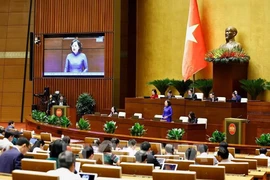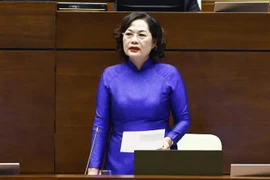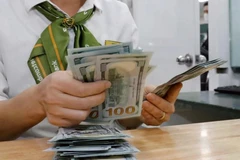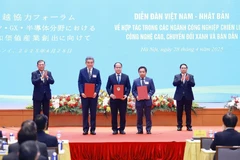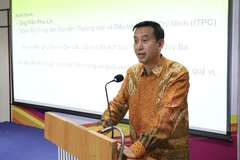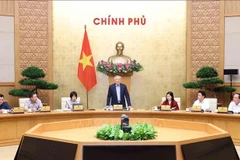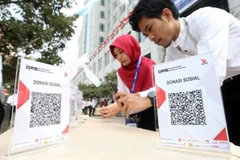Hanoi (VNA) - The US Dollar Index (DXY) is projected to stay high and persist longer than anticipated throughout 2025, exerting continued pressure on the Vietnamese dong exchange rate.
Global pressures
Analysts attribute the recent surge in the US dollar’s value to the Federal Reserve (Fed) signaling only two interest rate cuts in 2025, totaling 1%, instead of the four cuts announced in September last year. The DXY index has surpassed 108.6 points, its highest level in over two years, significantly affecting exchange rates in Vietnam.
In 2024, the USD/VND exchange rate experienced notable volatility, with two major spikes prompting interventions from the State Bank of Vietnam (SBV). The central bank stabilised the market through foreign currency sale, flexible liquidity management tools, and treasury bill operations while ensuring system liquidity via open market measures. At the end of the year, the exchange rate increase remained under the SBV’s 5.03% ceiling. According to Viet Dragon Securities Corporation (VDSC), the SBV sold an estimated 9.4 billion USD in 2024 to stabilise the exchange rate.
Financial analysts predicted that the USD/VND exchange rate will face numerous influences in 2025, including the pace of global economic recovery, Fed policies, geopolitical conflicts, and trade policies under President Donald Trump’s administration, which could strengthen the USD and increase pressure on the exchange rate.
Amid international market pressures and persistently high USD/VND rates at banks, analysts suggest the SBV may need to raise interest rates in 2025 to mitigate strain on foreign exchange reserves, which were significantly drawn down in 2024.
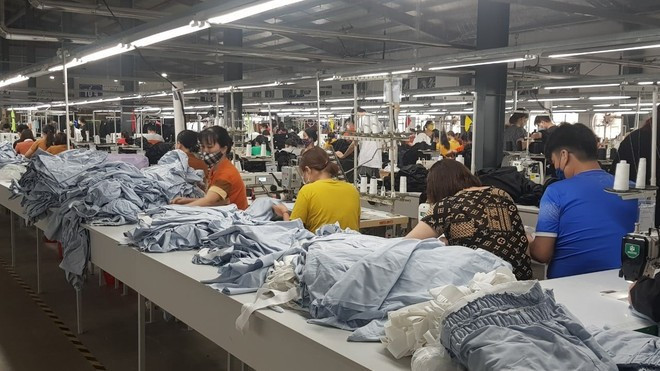
As of January 7, commercial banks listed their buying rates at 25,218 VND/USD and the selling rate at 25,548 VND/USD, down 5 VND from January 6. However, on January 2, the exchange rate peaked at 25,265 VND/USD for buying and 25,559 VND/USD for selling.
To ease exchange rate pressures during January 3 and 6 trading sessions, the SBV introduced a new intervention strategy. Instead of relying solely on spot USD sales, the SBV began offering forward contracts with cancellation options at a fixed rate of 25,450 VND/USD. This approach replaced the outright USD spot sales previously used, which injected over 9 billion VND into the market in 2024.
This strategy demonstrated the SBV’s confidence in maintaining the interbank exchange rate at approximately 25,450 VND/USD while dispelling market speculation about higher intervention rates.
Prepared for intervention
Nguyen Thi Phuong Lan, Director of VDSC’s Research Centre, forecast that the USD/VND exchange rate could strongly fluctuate in a +/-5% trading band in 2025, potentially reaching 26,200 VND/USD in later this year.
Lan emphasised that the US dollar is likely to remain strong in 2025, complicating the SBV’s efforts to stabilise the exchange rate. Challenges include limited foreign direct investment (FDI) disbursements to offset profit repatriation and persistent demand for USD due to elevated US interest rates amid declining forex reserves.
The Vietcombank Securities Company (VCBS) highlighted continued exchange rate pressures stemming from a strong US dollar and global central banks’ accommodative monetary policies. While geopolitical tensions may drive investors toward safe-haven assets like the US dollar, positive factors for Vietnam’s forex market include robust FDI inflows, remittances, and a projected trade surplus supported by recovering major economies.
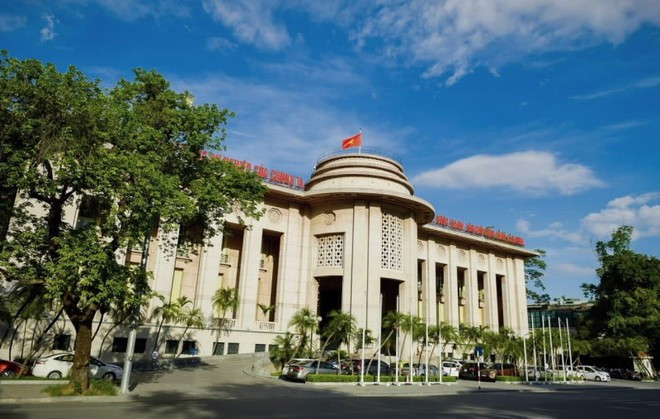
Financial expert Nguyen Tri Hieu predicted that President Donald Trump’s economic policies, such as tax cuts for high-income earners, could widen the US budget deficit, increase bond issuance, and spur inflation. This may lead the Fed to tighten monetary policy, strengthening the US dollar, pressuring the VND, and raising the USD/VND exchange rate.
Experts suggest that the SBV may need to adjust monetary policies, including interest rate hikes and other measures, to alleviate exchange rate pressures and curb inflation.
SBV leaders reaffirmed their readiness to intervene by selling foreign currency to stabilise the market. However, intervention efforts will depend on market dynamics, particularly the interbank USD/VND rate. Commercial banks will register to purchase USD from the SBV and subsequently resell it to customers based on demand./.

